Ethical Dilemmas and Moral Reasoning in International Business Context
VerifiedAdded on 2021/02/20
|7
|1755
|21
Journal and Reflective Writing
AI Summary
This assignment is a reflective journal exploring the evolution of moral reasoning and ethical decision-making in the context of international business. The journal delves into the student's learning journey, covering the application of ethical principles and theories such as Utilitarianism, Deontology, and Virtue Ethics. It examines the impact of these theories and case studies on the student's understanding of ethical dilemmas, stakeholder management, and the importance of ethical frameworks in business operations. The reflection highlights both positive and negative learning experiences, including challenges in applying theories to case studies and writing a code of conduct, while also emphasizing the value of teamwork and stakeholder analysis. The journal concludes with insights on how ethical reasoning is essential for improvisation in decision making and the need to continuously reflect on experiences to enhance ethical practices in international business.
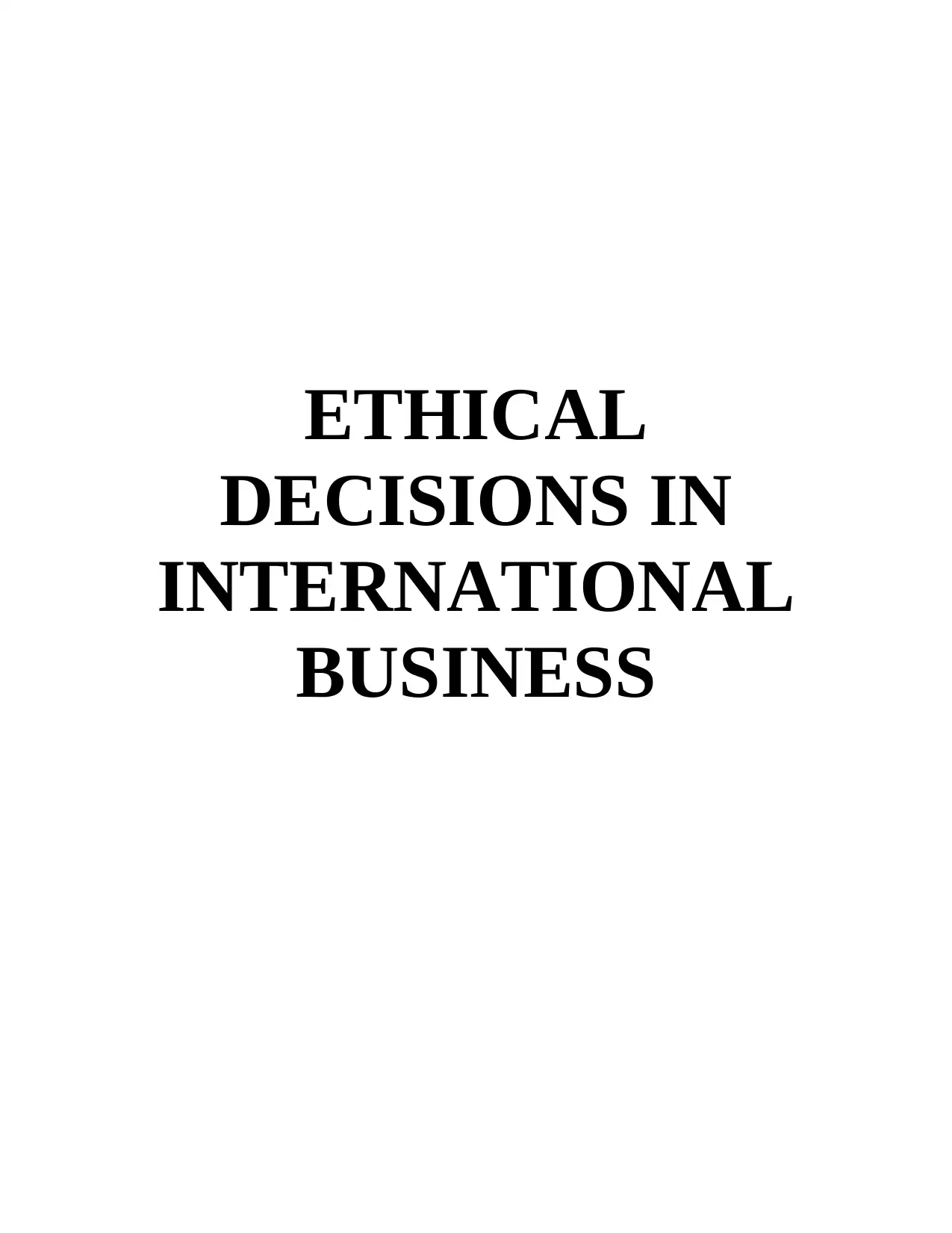
ETHICAL
DECISIONS IN
INTERNATIONAL
BUSINESS
DECISIONS IN
INTERNATIONAL
BUSINESS
Paraphrase This Document
Need a fresh take? Get an instant paraphrase of this document with our AI Paraphraser
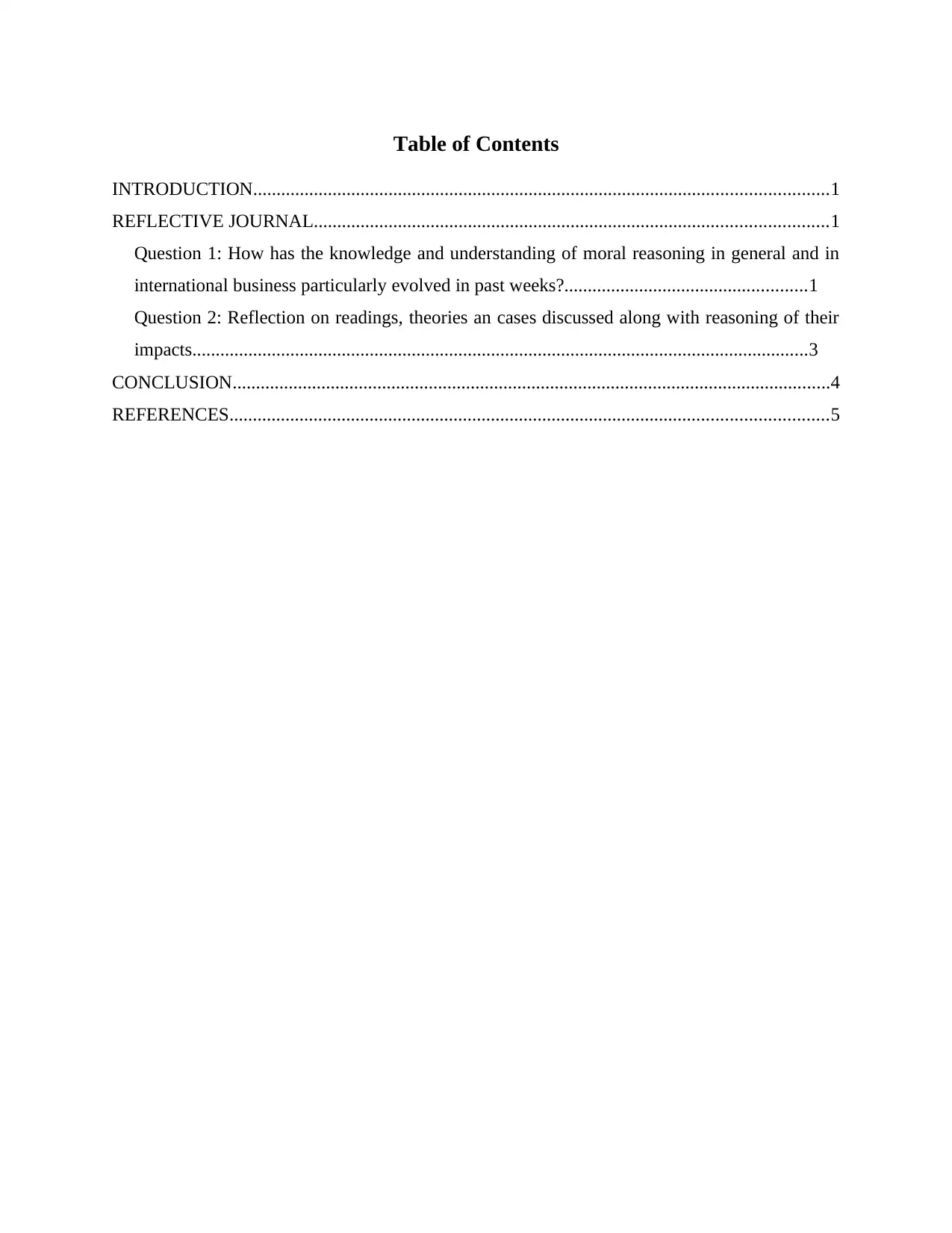
Table of Contents
INTRODUCTION...........................................................................................................................1
REFLECTIVE JOURNAL..............................................................................................................1
Question 1: How has the knowledge and understanding of moral reasoning in general and in
international business particularly evolved in past weeks?....................................................1
Question 2: Reflection on readings, theories an cases discussed along with reasoning of their
impacts....................................................................................................................................3
CONCLUSION................................................................................................................................4
REFERENCES................................................................................................................................5
INTRODUCTION...........................................................................................................................1
REFLECTIVE JOURNAL..............................................................................................................1
Question 1: How has the knowledge and understanding of moral reasoning in general and in
international business particularly evolved in past weeks?....................................................1
Question 2: Reflection on readings, theories an cases discussed along with reasoning of their
impacts....................................................................................................................................3
CONCLUSION................................................................................................................................4
REFERENCES................................................................................................................................5
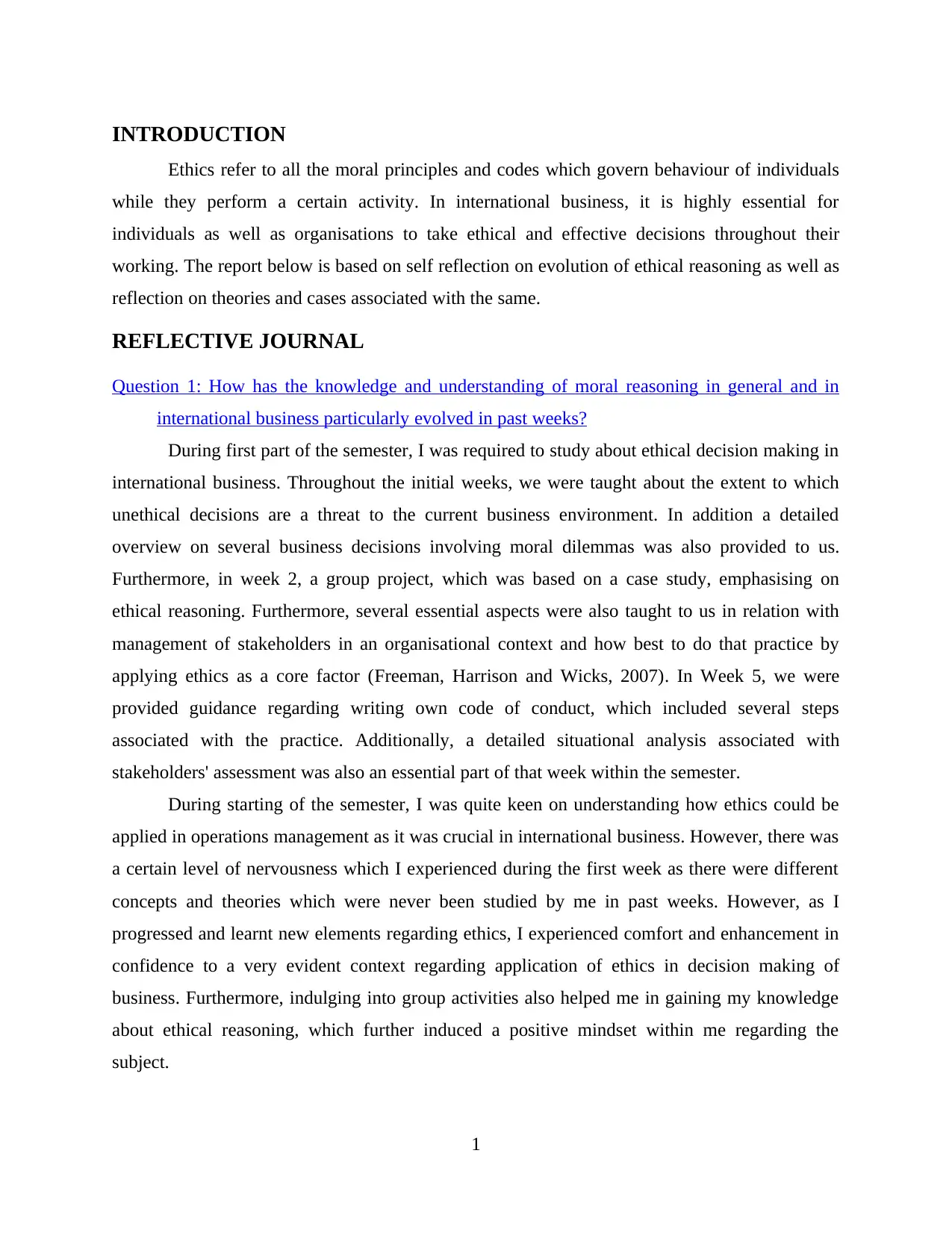
INTRODUCTION
Ethics refer to all the moral principles and codes which govern behaviour of individuals
while they perform a certain activity. In international business, it is highly essential for
individuals as well as organisations to take ethical and effective decisions throughout their
working. The report below is based on self reflection on evolution of ethical reasoning as well as
reflection on theories and cases associated with the same.
REFLECTIVE JOURNAL
Question 1: How has the knowledge and understanding of moral reasoning in general and in
international business particularly evolved in past weeks?
During first part of the semester, I was required to study about ethical decision making in
international business. Throughout the initial weeks, we were taught about the extent to which
unethical decisions are a threat to the current business environment. In addition a detailed
overview on several business decisions involving moral dilemmas was also provided to us.
Furthermore, in week 2, a group project, which was based on a case study, emphasising on
ethical reasoning. Furthermore, several essential aspects were also taught to us in relation with
management of stakeholders in an organisational context and how best to do that practice by
applying ethics as a core factor (Freeman, Harrison and Wicks, 2007). In Week 5, we were
provided guidance regarding writing own code of conduct, which included several steps
associated with the practice. Additionally, a detailed situational analysis associated with
stakeholders' assessment was also an essential part of that week within the semester.
During starting of the semester, I was quite keen on understanding how ethics could be
applied in operations management as it was crucial in international business. However, there was
a certain level of nervousness which I experienced during the first week as there were different
concepts and theories which were never been studied by me in past weeks. However, as I
progressed and learnt new elements regarding ethics, I experienced comfort and enhancement in
confidence to a very evident context regarding application of ethics in decision making of
business. Furthermore, indulging into group activities also helped me in gaining my knowledge
about ethical reasoning, which further induced a positive mindset within me regarding the
subject.
1
Ethics refer to all the moral principles and codes which govern behaviour of individuals
while they perform a certain activity. In international business, it is highly essential for
individuals as well as organisations to take ethical and effective decisions throughout their
working. The report below is based on self reflection on evolution of ethical reasoning as well as
reflection on theories and cases associated with the same.
REFLECTIVE JOURNAL
Question 1: How has the knowledge and understanding of moral reasoning in general and in
international business particularly evolved in past weeks?
During first part of the semester, I was required to study about ethical decision making in
international business. Throughout the initial weeks, we were taught about the extent to which
unethical decisions are a threat to the current business environment. In addition a detailed
overview on several business decisions involving moral dilemmas was also provided to us.
Furthermore, in week 2, a group project, which was based on a case study, emphasising on
ethical reasoning. Furthermore, several essential aspects were also taught to us in relation with
management of stakeholders in an organisational context and how best to do that practice by
applying ethics as a core factor (Freeman, Harrison and Wicks, 2007). In Week 5, we were
provided guidance regarding writing own code of conduct, which included several steps
associated with the practice. Additionally, a detailed situational analysis associated with
stakeholders' assessment was also an essential part of that week within the semester.
During starting of the semester, I was quite keen on understanding how ethics could be
applied in operations management as it was crucial in international business. However, there was
a certain level of nervousness which I experienced during the first week as there were different
concepts and theories which were never been studied by me in past weeks. However, as I
progressed and learnt new elements regarding ethics, I experienced comfort and enhancement in
confidence to a very evident context regarding application of ethics in decision making of
business. Furthermore, indulging into group activities also helped me in gaining my knowledge
about ethical reasoning, which further induced a positive mindset within me regarding the
subject.
1
⊘ This is a preview!⊘
Do you want full access?
Subscribe today to unlock all pages.

Trusted by 1+ million students worldwide
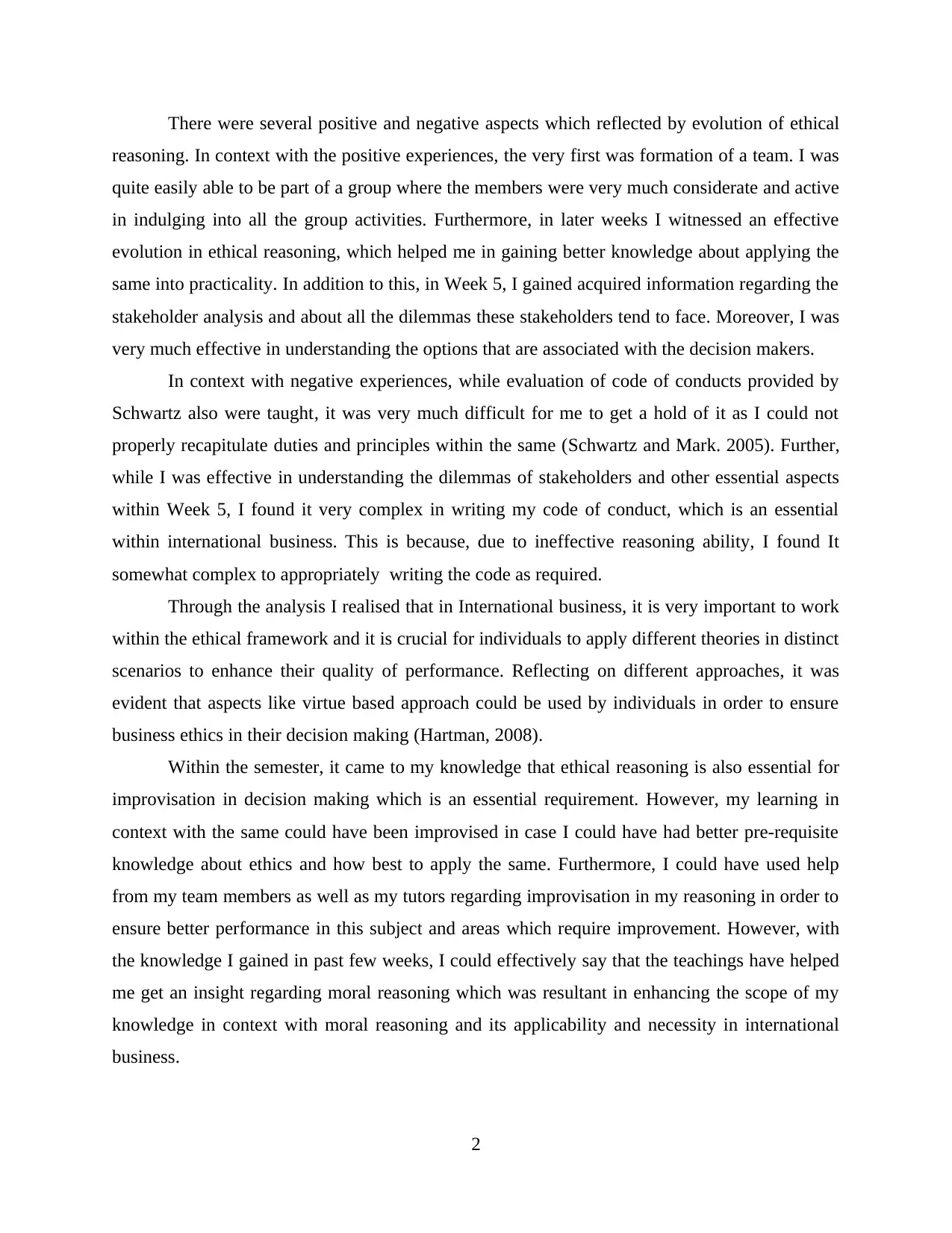
There were several positive and negative aspects which reflected by evolution of ethical
reasoning. In context with the positive experiences, the very first was formation of a team. I was
quite easily able to be part of a group where the members were very much considerate and active
in indulging into all the group activities. Furthermore, in later weeks I witnessed an effective
evolution in ethical reasoning, which helped me in gaining better knowledge about applying the
same into practicality. In addition to this, in Week 5, I gained acquired information regarding the
stakeholder analysis and about all the dilemmas these stakeholders tend to face. Moreover, I was
very much effective in understanding the options that are associated with the decision makers.
In context with negative experiences, while evaluation of code of conducts provided by
Schwartz also were taught, it was very much difficult for me to get a hold of it as I could not
properly recapitulate duties and principles within the same (Schwartz and Mark. 2005). Further,
while I was effective in understanding the dilemmas of stakeholders and other essential aspects
within Week 5, I found it very complex in writing my code of conduct, which is an essential
within international business. This is because, due to ineffective reasoning ability, I found It
somewhat complex to appropriately writing the code as required.
Through the analysis I realised that in International business, it is very important to work
within the ethical framework and it is crucial for individuals to apply different theories in distinct
scenarios to enhance their quality of performance. Reflecting on different approaches, it was
evident that aspects like virtue based approach could be used by individuals in order to ensure
business ethics in their decision making (Hartman, 2008).
Within the semester, it came to my knowledge that ethical reasoning is also essential for
improvisation in decision making which is an essential requirement. However, my learning in
context with the same could have been improvised in case I could have had better pre-requisite
knowledge about ethics and how best to apply the same. Furthermore, I could have used help
from my team members as well as my tutors regarding improvisation in my reasoning in order to
ensure better performance in this subject and areas which require improvement. However, with
the knowledge I gained in past few weeks, I could effectively say that the teachings have helped
me get an insight regarding moral reasoning which was resultant in enhancing the scope of my
knowledge in context with moral reasoning and its applicability and necessity in international
business.
2
reasoning. In context with the positive experiences, the very first was formation of a team. I was
quite easily able to be part of a group where the members were very much considerate and active
in indulging into all the group activities. Furthermore, in later weeks I witnessed an effective
evolution in ethical reasoning, which helped me in gaining better knowledge about applying the
same into practicality. In addition to this, in Week 5, I gained acquired information regarding the
stakeholder analysis and about all the dilemmas these stakeholders tend to face. Moreover, I was
very much effective in understanding the options that are associated with the decision makers.
In context with negative experiences, while evaluation of code of conducts provided by
Schwartz also were taught, it was very much difficult for me to get a hold of it as I could not
properly recapitulate duties and principles within the same (Schwartz and Mark. 2005). Further,
while I was effective in understanding the dilemmas of stakeholders and other essential aspects
within Week 5, I found it very complex in writing my code of conduct, which is an essential
within international business. This is because, due to ineffective reasoning ability, I found It
somewhat complex to appropriately writing the code as required.
Through the analysis I realised that in International business, it is very important to work
within the ethical framework and it is crucial for individuals to apply different theories in distinct
scenarios to enhance their quality of performance. Reflecting on different approaches, it was
evident that aspects like virtue based approach could be used by individuals in order to ensure
business ethics in their decision making (Hartman, 2008).
Within the semester, it came to my knowledge that ethical reasoning is also essential for
improvisation in decision making which is an essential requirement. However, my learning in
context with the same could have been improvised in case I could have had better pre-requisite
knowledge about ethics and how best to apply the same. Furthermore, I could have used help
from my team members as well as my tutors regarding improvisation in my reasoning in order to
ensure better performance in this subject and areas which require improvement. However, with
the knowledge I gained in past few weeks, I could effectively say that the teachings have helped
me get an insight regarding moral reasoning which was resultant in enhancing the scope of my
knowledge in context with moral reasoning and its applicability and necessity in international
business.
2
Paraphrase This Document
Need a fresh take? Get an instant paraphrase of this document with our AI Paraphraser
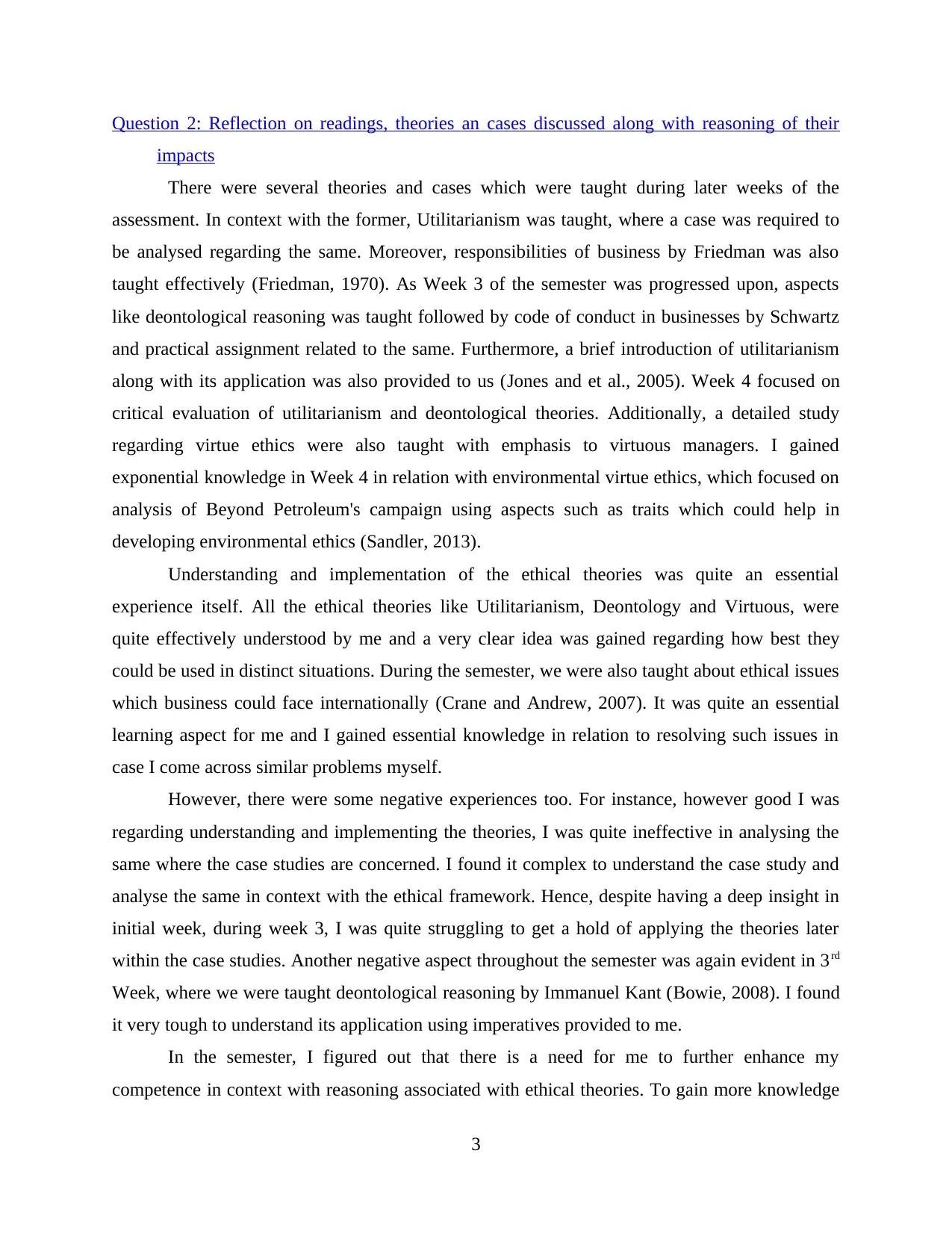
Question 2: Reflection on readings, theories an cases discussed along with reasoning of their
impacts
There were several theories and cases which were taught during later weeks of the
assessment. In context with the former, Utilitarianism was taught, where a case was required to
be analysed regarding the same. Moreover, responsibilities of business by Friedman was also
taught effectively (Friedman, 1970). As Week 3 of the semester was progressed upon, aspects
like deontological reasoning was taught followed by code of conduct in businesses by Schwartz
and practical assignment related to the same. Furthermore, a brief introduction of utilitarianism
along with its application was also provided to us (Jones and et al., 2005). Week 4 focused on
critical evaluation of utilitarianism and deontological theories. Additionally, a detailed study
regarding virtue ethics were also taught with emphasis to virtuous managers. I gained
exponential knowledge in Week 4 in relation with environmental virtue ethics, which focused on
analysis of Beyond Petroleum's campaign using aspects such as traits which could help in
developing environmental ethics (Sandler, 2013).
Understanding and implementation of the ethical theories was quite an essential
experience itself. All the ethical theories like Utilitarianism, Deontology and Virtuous, were
quite effectively understood by me and a very clear idea was gained regarding how best they
could be used in distinct situations. During the semester, we were also taught about ethical issues
which business could face internationally (Crane and Andrew, 2007). It was quite an essential
learning aspect for me and I gained essential knowledge in relation to resolving such issues in
case I come across similar problems myself.
However, there were some negative experiences too. For instance, however good I was
regarding understanding and implementing the theories, I was quite ineffective in analysing the
same where the case studies are concerned. I found it complex to understand the case study and
analyse the same in context with the ethical framework. Hence, despite having a deep insight in
initial week, during week 3, I was quite struggling to get a hold of applying the theories later
within the case studies. Another negative aspect throughout the semester was again evident in 3rd
Week, where we were taught deontological reasoning by Immanuel Kant (Bowie, 2008). I found
it very tough to understand its application using imperatives provided to me.
In the semester, I figured out that there is a need for me to further enhance my
competence in context with reasoning associated with ethical theories. To gain more knowledge
3
impacts
There were several theories and cases which were taught during later weeks of the
assessment. In context with the former, Utilitarianism was taught, where a case was required to
be analysed regarding the same. Moreover, responsibilities of business by Friedman was also
taught effectively (Friedman, 1970). As Week 3 of the semester was progressed upon, aspects
like deontological reasoning was taught followed by code of conduct in businesses by Schwartz
and practical assignment related to the same. Furthermore, a brief introduction of utilitarianism
along with its application was also provided to us (Jones and et al., 2005). Week 4 focused on
critical evaluation of utilitarianism and deontological theories. Additionally, a detailed study
regarding virtue ethics were also taught with emphasis to virtuous managers. I gained
exponential knowledge in Week 4 in relation with environmental virtue ethics, which focused on
analysis of Beyond Petroleum's campaign using aspects such as traits which could help in
developing environmental ethics (Sandler, 2013).
Understanding and implementation of the ethical theories was quite an essential
experience itself. All the ethical theories like Utilitarianism, Deontology and Virtuous, were
quite effectively understood by me and a very clear idea was gained regarding how best they
could be used in distinct situations. During the semester, we were also taught about ethical issues
which business could face internationally (Crane and Andrew, 2007). It was quite an essential
learning aspect for me and I gained essential knowledge in relation to resolving such issues in
case I come across similar problems myself.
However, there were some negative experiences too. For instance, however good I was
regarding understanding and implementing the theories, I was quite ineffective in analysing the
same where the case studies are concerned. I found it complex to understand the case study and
analyse the same in context with the ethical framework. Hence, despite having a deep insight in
initial week, during week 3, I was quite struggling to get a hold of applying the theories later
within the case studies. Another negative aspect throughout the semester was again evident in 3rd
Week, where we were taught deontological reasoning by Immanuel Kant (Bowie, 2008). I found
it very tough to understand its application using imperatives provided to me.
In the semester, I figured out that there is a need for me to further enhance my
competence in context with reasoning associated with ethical theories. To gain more knowledge
3
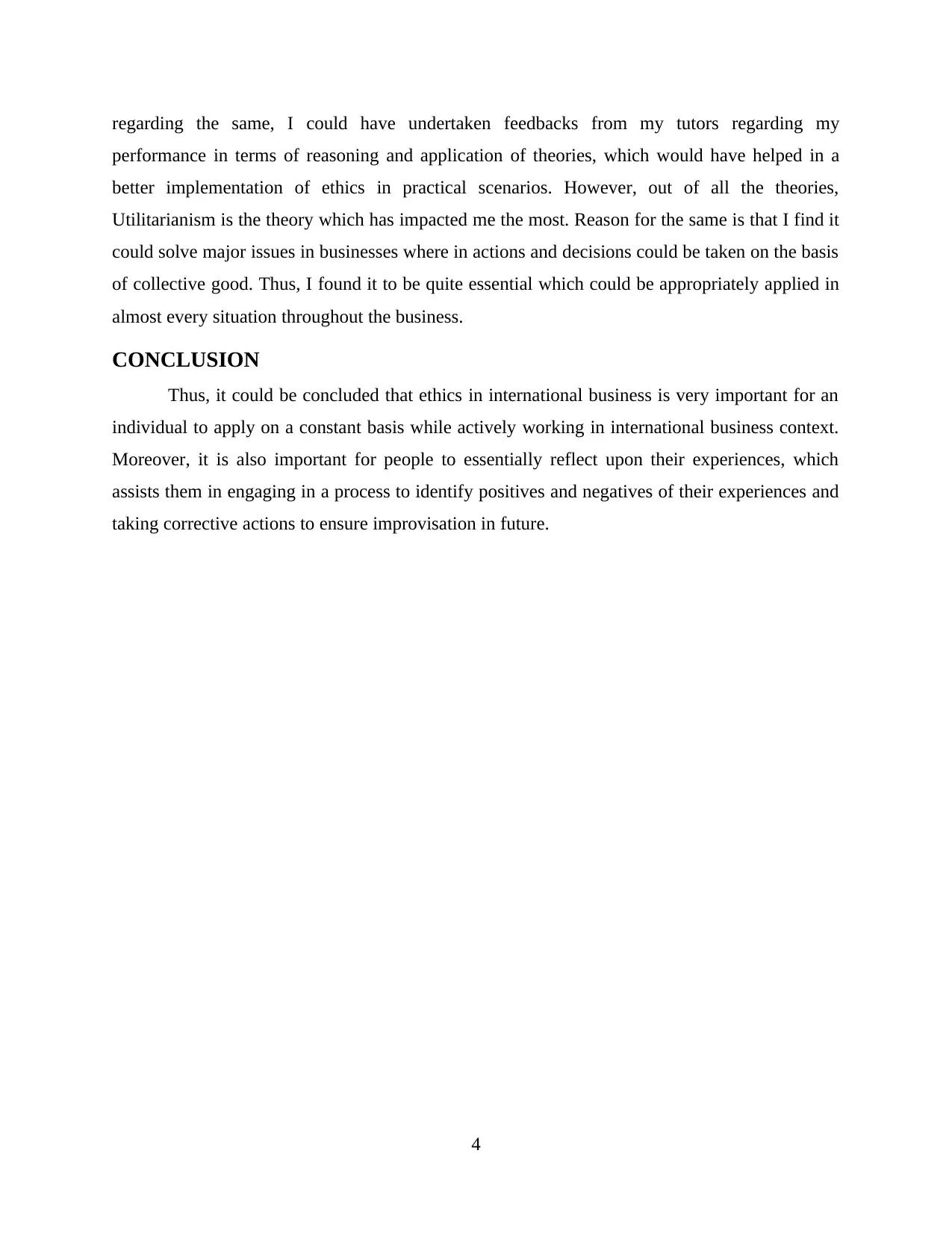
regarding the same, I could have undertaken feedbacks from my tutors regarding my
performance in terms of reasoning and application of theories, which would have helped in a
better implementation of ethics in practical scenarios. However, out of all the theories,
Utilitarianism is the theory which has impacted me the most. Reason for the same is that I find it
could solve major issues in businesses where in actions and decisions could be taken on the basis
of collective good. Thus, I found it to be quite essential which could be appropriately applied in
almost every situation throughout the business.
CONCLUSION
Thus, it could be concluded that ethics in international business is very important for an
individual to apply on a constant basis while actively working in international business context.
Moreover, it is also important for people to essentially reflect upon their experiences, which
assists them in engaging in a process to identify positives and negatives of their experiences and
taking corrective actions to ensure improvisation in future.
4
performance in terms of reasoning and application of theories, which would have helped in a
better implementation of ethics in practical scenarios. However, out of all the theories,
Utilitarianism is the theory which has impacted me the most. Reason for the same is that I find it
could solve major issues in businesses where in actions and decisions could be taken on the basis
of collective good. Thus, I found it to be quite essential which could be appropriately applied in
almost every situation throughout the business.
CONCLUSION
Thus, it could be concluded that ethics in international business is very important for an
individual to apply on a constant basis while actively working in international business context.
Moreover, it is also important for people to essentially reflect upon their experiences, which
assists them in engaging in a process to identify positives and negatives of their experiences and
taking corrective actions to ensure improvisation in future.
4
⊘ This is a preview!⊘
Do you want full access?
Subscribe today to unlock all pages.

Trusted by 1+ million students worldwide
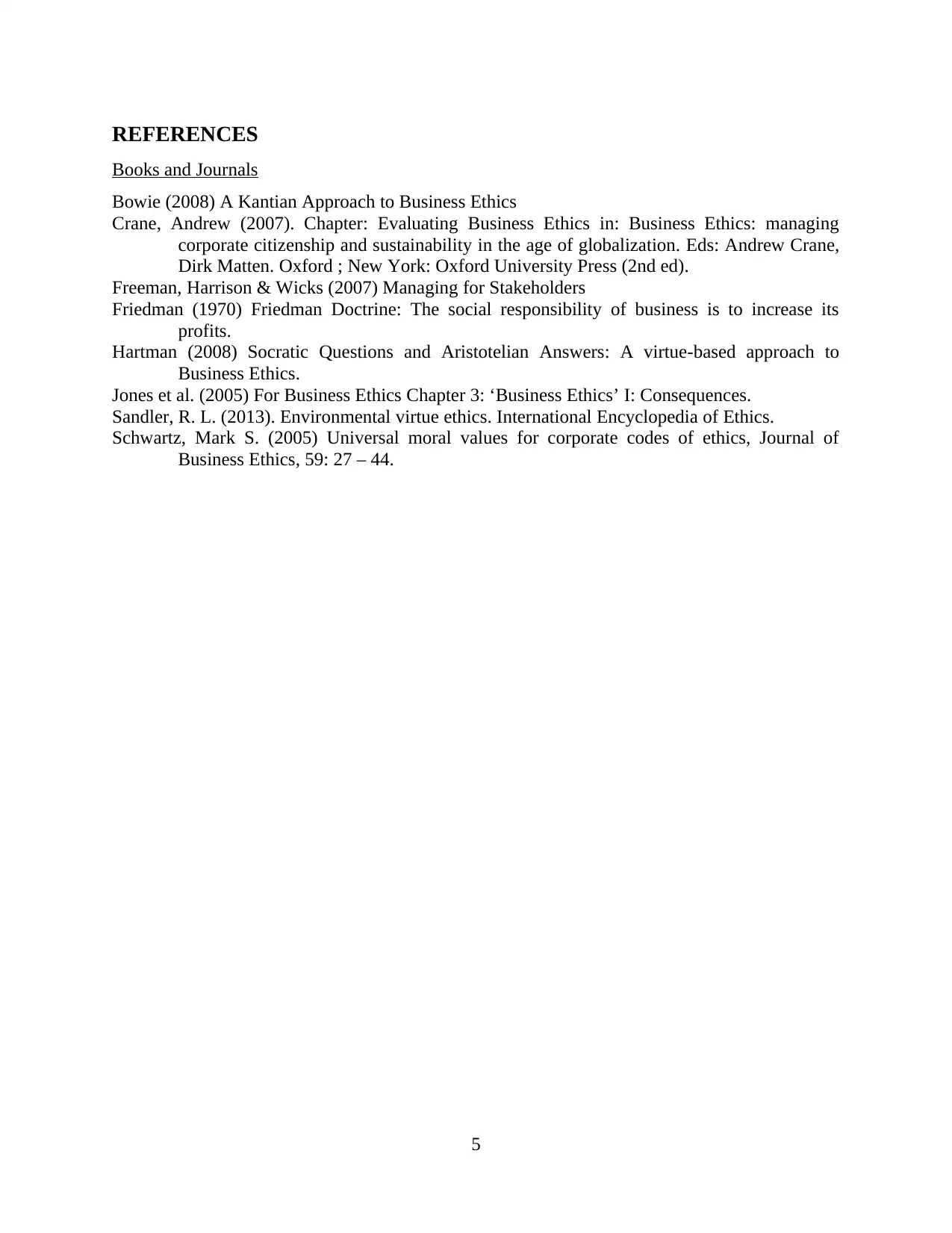
REFERENCES
Books and Journals
Bowie (2008) A Kantian Approach to Business Ethics
Crane, Andrew (2007). Chapter: Evaluating Business Ethics in: Business Ethics: managing
corporate citizenship and sustainability in the age of globalization. Eds: Andrew Crane,
Dirk Matten. Oxford ; New York: Oxford University Press (2nd ed).
Freeman, Harrison & Wicks (2007) Managing for Stakeholders
Friedman (1970) Friedman Doctrine: The social responsibility of business is to increase its
profits.
Hartman (2008) Socratic Questions and Aristotelian Answers: A virtue-based approach to
Business Ethics.
Jones et al. (2005) For Business Ethics Chapter 3: ‘Business Ethics’ I: Consequences.
Sandler, R. L. (2013). Environmental virtue ethics. International Encyclopedia of Ethics.
Schwartz, Mark S. (2005) Universal moral values for corporate codes of ethics, Journal of
Business Ethics, 59: 27 – 44.
5
Books and Journals
Bowie (2008) A Kantian Approach to Business Ethics
Crane, Andrew (2007). Chapter: Evaluating Business Ethics in: Business Ethics: managing
corporate citizenship and sustainability in the age of globalization. Eds: Andrew Crane,
Dirk Matten. Oxford ; New York: Oxford University Press (2nd ed).
Freeman, Harrison & Wicks (2007) Managing for Stakeholders
Friedman (1970) Friedman Doctrine: The social responsibility of business is to increase its
profits.
Hartman (2008) Socratic Questions and Aristotelian Answers: A virtue-based approach to
Business Ethics.
Jones et al. (2005) For Business Ethics Chapter 3: ‘Business Ethics’ I: Consequences.
Sandler, R. L. (2013). Environmental virtue ethics. International Encyclopedia of Ethics.
Schwartz, Mark S. (2005) Universal moral values for corporate codes of ethics, Journal of
Business Ethics, 59: 27 – 44.
5
1 out of 7
Related Documents
Your All-in-One AI-Powered Toolkit for Academic Success.
+13062052269
info@desklib.com
Available 24*7 on WhatsApp / Email
![[object Object]](/_next/static/media/star-bottom.7253800d.svg)
Unlock your academic potential
Copyright © 2020–2026 A2Z Services. All Rights Reserved. Developed and managed by ZUCOL.




